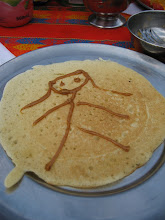Dear Reader
As a kid, I wanted to be a pediatrician, a florist, or Laura from "Little House on the Prairie." Even upon entering college, I knew for sure that I did NOT want to major in English. Fate, however, has a funny way of intervening and lo and behold, I graduated with an English degree and was qualified for everything and nothing.
The years following graduation were filled with both angst at not knowing what the heck I was supposed to be now that I was supposedly grown up as well as the excitement of having almost all my options still open. Should I go to law school? Graduate school? Work? I took most of the standardized tests out there in anticipation, but eventually went down the education route. (I had become my mother (who was a geography teacher)!)
As it turns out, teaching has been a good fit for me. Being a bit of a do-gooder, it's been important to me that my work has some connection with my belief that we're put here on this earth for more than just consuming resources and acquiring more possessions. Having a captive audience to inflict my views on has been loads of fun. My English 101 class this quarter at EvCC has been an especially accomodating and motivating bunch of students. As willing guinea pigs, they have allowed me to experiment with the class and the methods and materials used in teaching it and only a few have come out scarred for life. Seriously though, it has been a labor of love working with this class and I appreciate all of my students' efforts, despite other family, class, and work committments, in making this an excellent journey in social and literary criticism.
In the following eportfolio blog, please find the four assignments that I have found most exciting, challenging, in need of revision, and just plain fun.
Cheers, Phebe

